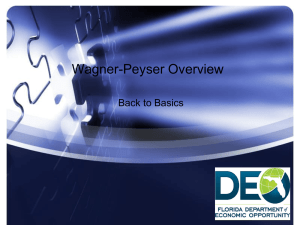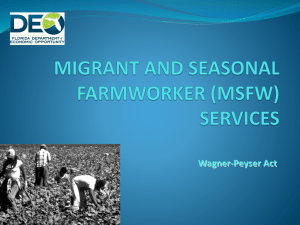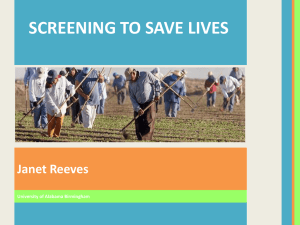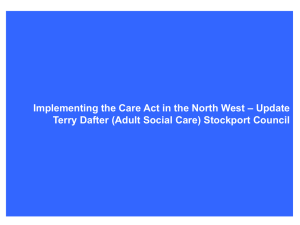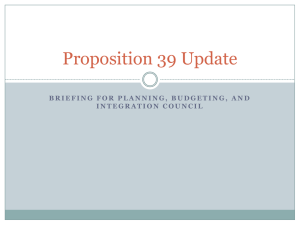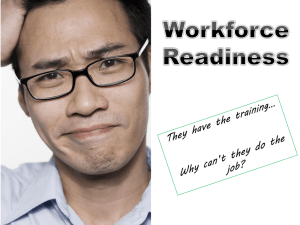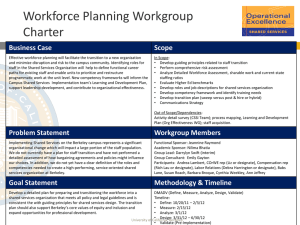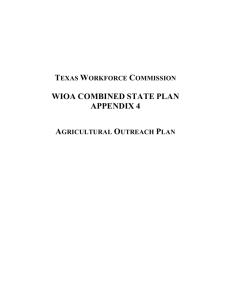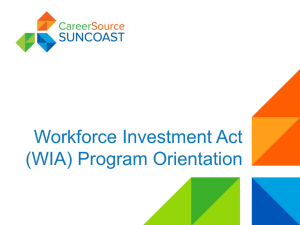Partnering with the Florida Farmworker Jobs and Education
advertisement
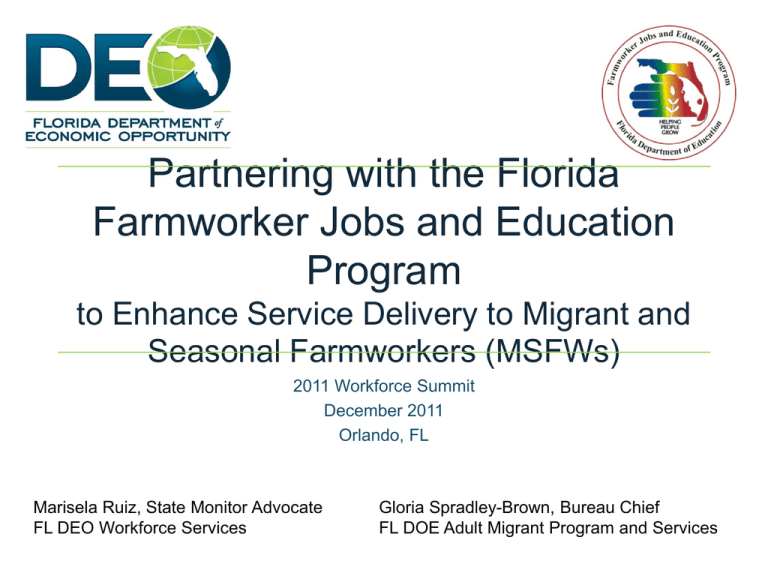
Partnering with the Florida Farmworker Jobs and Education Program to Enhance Service Delivery to Migrant and Seasonal Farmworkers (MSFWs) 2011 Workforce Summit December 2011 Orlando, FL Marisela Ruiz, State Monitor Advocate FL DEO Workforce Services Gloria Spradley-Brown, Bureau Chief FL DOE Adult Migrant Program and Services Wagner-Peyser Act Regulations Background on Employment Services to MSFWs 1972 - Lawsuit filed by NAACP against Department of Labor (DOL) alleging discriminatory actions, including inequitable treatment and services to migrant and seasonal farmworkers (MSFWs) in state employment offices 1974 - Judge Charles Richey Court Order required DOL to undertake specified actions on providing MSFWs all employment services on a non-discriminating basis Establishment of Federal regulations governing Wagner-Peyser Act Employment Services for MSFWs (20 CFR 653) Full-time MSFW Outreach Workers in One-Stop Centers where a large number of MSFWs are known to be Federal and State Monitor Advocate System Establishment of Job Service Complaint System (20 CFR 658) MSFW Definition per Wagner-Peyser Regulations Seasonal Farmworker Worked at least 25 days (or parts of days) performing farmwork during the last 12 months AND Earned at least one half of total income performing farmwork AND Was not employed in farmwork by the same employer all year (for this purpose only, a farm labor contractor is not considered an employer) Migrant Farmworker A seasonal farmworker AND Has to travel to do farmwork AND Is unable to return to permanent residence within the same day Migrant Food Processing Worker Worked at least 25 days (or parts of days) doing food processing during the last 12 months AND Earned at least one half of total income from food processing AND Was not employed year round by the same employer Has to travel to do food processing AND Is unable to return to permanent residence within the same day MSFW Desk Aid Wagner-Peyser Act Employment Services for MSFWs Federal regulations require that every One-Stop Career Center offer to MSFWs the full range of quality employment services, benefits and protections, on an equal level as non-MSFWs Counseling Testing Job referrals Training referral services Referrals to supportive services In providing such services, staff shall consider and be sensitive to the preferences, needs, and skills of individual MSFWs and the availability of job and training opportunities. Wagner-Peyser Act Employment Services for MSFWs Every One-Stop Career Center shall determine whether or not applicants are MSFWs as defined at 20 CFR 651.10 (summarized in previous slide). Appropriate coding must be used in Employ Florida Marketplace. Staff must explain verbally to MSFW customers the services available through the One-Stop system and provide them a copy of the 511N Form (available in English, Spanish and Creole). Wagner-Peyser Act Employment Services for MSFWs Staff shall provide assistance in completing a full application for MSFW applicants. Significant work history Training and educational background Statement of desired employment Training needs Crop codes Further guidance for completing a full application and other MSFW requirements can be found in Final Guidance 03-040. Workforce Investment Act Regulations Workforce Investment Act and the Required MSFW Partner The Workforce Investment Act (WIA) Title I indicates that programs authorized under Title I are required partners of the one-stop delivery system. The workforce investment MSFW program established under WIA Title I, Section 167 is the National Farmworker Jobs Program (NFJP). This program is nationally administered by the US Department of Labor. Workforce Investment Act and the Required MSFW Partner The NFJP grantee for the State of Florida is the Department of Education, Adult Migrant Program and Services. Florida Farmworker Jobs and Education Program (FJEP) Manages 17 projects in Florida FJEP is implemented through sub-recipient agencies located in highly populated farmworker communities. Local providers are non-profit agencies, county governments, state and community colleges, technical centers, and school districts. Regions Where Farmworker Jobs and Education Programs are Present 1 Okaloosa Santa Rosa 2 Walton Holmes Jackson Washington Escambia 3 Calhoun Nassau Gadsden Leon 5 Liberty Bay Wakulla Gulf 4 Jefferson Hamilton M adison Baker Suwannee Taylor 6 Duval Columbia 7 Lafayette Clay Franklin Bradford Alachua Dixie Gilchrist 9 8 St. Johns Putnam Flagler Levy M arion 10 Regional Workforce Board County Map 1 2 3 4 5 6 7 8 9 10 11 12 13 14 15 16 17 18 19 20 21 22 23 24 Escambia and Santa Rosa Okaloosa and Walton Calhoun, Holmes, Liberty, Jackson and Washington Bay, Gulf and Franklin Leon, Gadsden and Wakulla Madison, Suwannee, Taylor, Hamilton, Jefferson and Lafayette Gilchrist, Union, Columbia and Dixie St. Johns, Clay, Duval, Nassau, Baker and Putnam Alachua and Bradford Citrus, Levy and Marion Volusia and Flagler Orange, Osceola, Seminole, Lake and Sumter Brevard Pinellas Hillsborough Pasco and Hernando Polk Sarasota and Manatee DeSoto, Hardee and Highlands Okeechobee, Martin, St. Lucie and Indian River Palm Beach Broward Miami-Dade and Monroe Charlotte, Collier, Glades, Hendry and Lee Volusia 11 Citrus Sumter Lake Seminole 12 Hernando 16 Brevard Orange Pasco Osceola Polk 13 Hillsborough 14 15 17 Indian River M anatee 18 Hardee DeSoto Highlands Okeechobee 19 St. Lucie 20 M artin Glades Sarasota Charlotte Palm Beach Hendry Lee 24 21 Collier Broward 22 M iami- Dade M onroe 23 MSFW Eligibility per WIA Regulations A migrant or seasonal farmworker who: Performed farm work during the 12 month eligibility determination period (the eligibility determination period is any consecutive 12 month period within the 24 month period immediately preceding the date of application for enrollment) Received at least 50% of their total earned income or been employed at least 50% of their total work time in farm work Worked at least 25 days or earned at least $800 in farm work Income does not exceed the higher of either the Health and Human Services (HHS) poverty line or 70% of the Lower Living Standard Income Level (LLSIL) May be a dependent of the qualifying farmworker FJEP Services for MSFWs Skills assessment Career assessment ESOL, if needed Adult Basic Education, if needed Short-term job skills training (vocational, technical, OJT, work experience) Tuition assistance after Pell Grant determination Books, uniforms, tools Transportation Career counseling and advisement Remediation, if needed Needs-based allowances for classroom attendance Paid testing and licensing fees Job search, placement and follow-up Why Collaboration? It is required by the Workforce Investment Act Strong focus from federal level – US DOL Common goals / common measures Can benefit performance measures Entered Employment Employment Retention Average Earnings To improve services offered More cost efficient Maximize limited resources Minimize duplication of services Everyone benefits Benefits to Participants Better assessment of the participant’s needs Access to a wider range of services and resources Reduction in the barriers to accessing services Increased expertise of staff providing services Integration through Collaboration FJEP representation on Workforce Board, as required by WIA, Section 117 Advisory Board meetings / Interagency meetings Community outreach Joint effort to eliminate barriers for MSFW customers Workshop / orientation on One-Stop programs Integration through Collaboration Concurrent enrollment WIA Adult and Dislocated Worker Wagner-Peyser Cost-sharing WIA Youth participation through FJEP outreach Shared participant information Shared outcomes WIA Co-Enrollment for MSFWs FJEP participants can be co-enrolled in WIA Adult, Dislocated Worker, or Youth Database sharing Facilitates case management Prevents duplication of services Increase performance by driving outcomes FJEP staff have smaller case load More intensive case management Follow-up services Workshops and pre-vocational classes through One-Stop References Federal Regulations 20 CFR 651 - General Provisions Governing the Federal-State Employment Service System Federal Regulations 20 CFR 653 – Services of the Employment Service System Workforce Investment Act of 1998 Federal Regulations 20 CFR 669 - National Farmworker Jobs Program Under Title I of the Workforce Investment Act Questions? Contact Information Marisela Ruiz Senior Monitor Advocate Workforce Program Support Division of Workforce Services Florida Department of Economic Opportunity Marisela.Ruiz@deo.myflorida.com (850) 921-3207 Gloria Spradley-Brown Bureau Chief Grants Administration and Compliance Florida Department of Education gloria.spradley@fldoe.org (850) 245-9053
